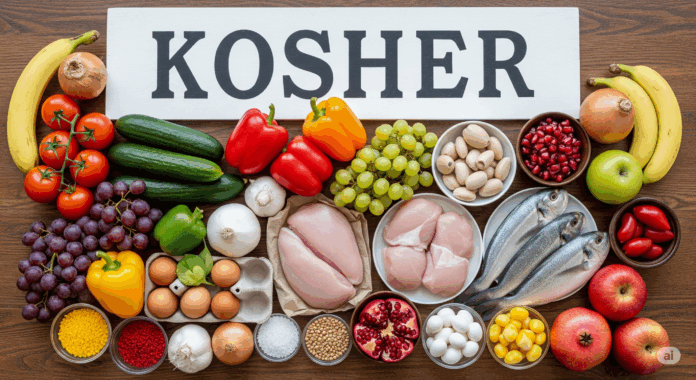
By Rabbi Moshe Elefant, Chief Working Officer of OU Kosher
Key takeaways:
- Meals producers should anticipate and plan for upcoming regulatory bans on artificial components and unstable international commerce insurance policies that influence ingredient sourcing, particularly for plant-based alternate options.
- The growing client demand for vegetarian, vegan, and allergy-friendly merchandise necessitates cautious ingredient choice and could also be impacted by shifts in the direction of animal-based alternate options on account of regulatory modifications or tariffs.
- Kosher certification companies supply beneficial steering, databases of licensed substances, and experience in sourcing plant-based alternate options, serving to producers navigate provide chain disruptions and meet numerous client dietary wants.
Tariffs and proposed regulatory modifications that would ban some artificial components are amongst a number of elements creating uncertainty within the meals provide chain as we speak. Whereas the entire sector faces potential ramifications, there are explicit issues for manufacturers that serve the rising variety of shoppers with particular dietary wants or preferences. Amongst these shoppers are vegetarians, vegans, these with allergic reactions and different well being issues, as lots of the proposed modifications might make it harder for manufacturers to supply non-animal-based substances. This can be a key viewers that many manufacturers need to serve, as as much as 63% of People report sticking to vegan or vegetarian choices for not less than some meals.
Latest proposed regulatory modifications, meant to enhance the well being and security of the meals provide by banning sure artificial components or substances, will probably require manufacturers to regulate their substances, manufacturing course of, and sourcing of supplies. These proposals come amid ongoing volatility within the international provide chain, because the U.S. re-evaluates its tariffs and commerce insurance policies with main ingredient-supplying nations, together with China and Mexico. Whereas latest agreements to keep away from steep tariffs supply optimism, uncertainty stays, including to the challenges manufacturers face when sourcing suppliers and substances. In such an surroundings, plant-based merchandise may turn out to be harder or costly to search out, presenting a problem to producers and types that keep away from or are particularly selective about using animal merchandise.
For instance, one of the vital regulatory proposals seeks to get rid of FD&C Purple 40, a widely-used artificial crimson meals dye. If that’s certainly banned, the obvious substitute is a crimson dye referred to as E120, derived from cochineal beetles, thus rendering merchandise that use it off-limits for strict vegetarians and vegans, and danger making such merchandise not interesting to many others just because they include insect-based substances.
Purple 40 will not be the one artificial dye dealing with a ban; the FDA is contemplating comparable insurance policies relating to different dyes, together with a few of these used to make meals blue, inexperienced and yellow, and a number of other states have moved to cease using different artificial meals dyes. Like with Purple 40, lots of the most typical pure alternate options are made out of animal-based substances.
One other vital creating scenario issues the pricing and availability of vegetable-based glycerin, on account of tariffs imposed on international locations producing it. The rising costs will probably drive corporations to look towards cheaper animal fat-based alternate options, as glycerin is a typical ingredient used to protect moisture and add texture and sweetness to many meals. However many of those don’t meet vegetarian, vegan, and different client wants, together with these of buyers trying to scale back ldl cholesterol or animal fats consumption.
With the intention to take care of the modifications within the meals provide whereas persevering with to fulfill client demand, meals producers want to start out fascinated by tomorrow and have a plan in place. They should be ready and know what to do if they should make modifications.
One supply of assist and steering for meals corporations in search of to switch artificial dyes or discover new and inexpensive sources of substances amid the worldwide commerce volatility, is kosher certification corporations, which oversee and certify the manufacturing of tens of millions of merchandise within the U.S. and world wide. Greater than 12 million U.S. shoppers search out not less than some kosher-certified merchandise every year, and lots of of them select these merchandise as a result of kosher requirements overlap with these of vegans, vegetarians, and people with allergic reactions and well being issues.
With the intention to meet spiritual laws, the kosher certification trade is well-versed in paying cautious consideration to even small traces of animal- or insect-based substances, and reflecting this within the language on its certification stamp. This comes from the truth that animals like bugs and pigs usually are not kosher, and that many byproducts of such non-kosher animals are additionally not kosher, so kosher-certified merchandise should guarantee they aren’t utilized in manufacturing. Any animal or animal-byproduct that’s licensed kosher should come from a kosher animal, together with chickens and cows, and be slaughtered in line with spiritual legal guidelines. As well as, kosher legal guidelines prohibit the blending of meat and dairy, so dairy merchandise like cheese can’t include further animal-based parts, just like the generally used rennet. Along with labeling kosher merchandise both “meat” or “dairy,” primarily based on their substances, the kosher system additionally has an extra class referred to as “pareve,” referring to meals that don’t include any meat or dairy, such that vegans and lactose-intolerant shoppers can relaxation assured that merchandise with a “parve” kosher certification don’t include any dairy substances.
Kosher certification companies, together with the Orthodox Union, the world’s largest certification company, which I oversee, may help corporations get rid of using animal-based substances. This consists of serving to corporations establish, discover, and even manufacture plant-based alternate options. The OU and others continuously monitor the worldwide meals chain, preserving observe of which substances meet their requirements and who can present them. For instance, the OU has a database of tens of millions of substances accessible for meals corporations to make use of to search out alternate options, together with for the meals dyes set to be banned, or for extra inexpensive and accessible suppliers of plant-based glycerin and different substances whose provide is in danger from the brand new tariffs.
Rabbis who information corporations by way of the kosher certification course of are specialists on meals substances and may work with corporations to offer recommendation and make plans for what substances or various suppliers meals corporations can use — not simply to fulfill kosher necessities, but additionally to adjust to laws and meet altering market situations. As well as, if a meals producer has recognized a brand new or various ingredient or provider, these rabbis can work with them to get that ingredient licensed kosher, opening up new choices that higher meet present or future wants, together with these of vegan and vegetarian shoppers.
The important thing to manufacturers navigating the present uncertainty is to plan forward and perceive their choices. Kosher certification companies are amongst these ready to assist be sure that the meals provide chain adapts as wanted and shoppers with particular dietary wants of every kind proceed to have the ability to buy meals that meet their dietary necessities.
 Rabbi Moshe Elefant is the Chief Working Officer of OU Kosher. As an trade knowledgeable, Rabbi Elefant oversees the certification and month-to-month inspection of 13,000 vegetation in 105 international locations.
Rabbi Moshe Elefant is the Chief Working Officer of OU Kosher. As an trade knowledgeable, Rabbi Elefant oversees the certification and month-to-month inspection of 13,000 vegetation in 105 international locations.












